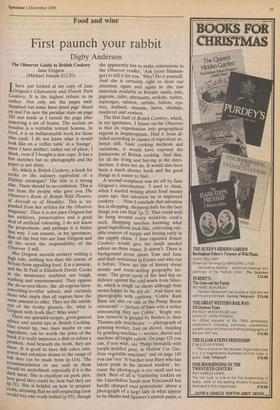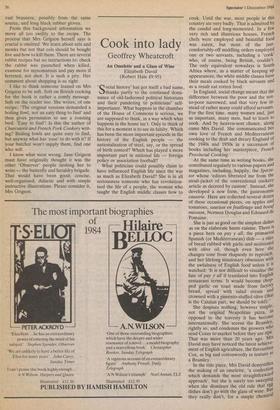Food and wine
First paunch your rabbit
Digby Anderson
The Observer Guide to British Cookery Jane Grigson (Michael Joseph £12.95)
Ihave just looked at my copy of Jane Grigson's Charcuterie and French Pork Cookery. It is the highest tribute to its author. Not only are the pages well- thumbed but some have dried pigs' blood on and I'm sure the peculiar stain on page 243 was made as I turned the page after removing a set of brains. The section on boudins is a veritable textual Somme. In brief, it is an indispensable book for those who cook. I do not know what it would look like on a 'coffee table' in a 'lounge', since I have neither; rather out of place, I think, even if I bought a new copy. It has a few sketches but no photographs and the Paper is not shiny. So, which is British Cookery, a book for cooks or the culinary equivalent of a Habitat catalogue? The title is a strong clue. There should be no confusion. This is not from the people who gave you The Observer's Book of British Wild Flowers, of Aircraft or of Heraldry. This is 'ex- panded from her articles for the Observer magazine'. Thus it is not pure Grigson but has additives, preservatives and a good deal of artificial colouring. I do not know the proportions, and perhaps it is better that way. I can assume, in my ignorance, that all the best bits are Jane Grigson and all the worst the responsibility of the Observer. I will.
Mrs Grigson accords cookery writing a high role, nothing less than the rescue of Britain from appalling food. It is a mission, and the St Paul is Elizabeth David. Cooks In the missionary tradition are tough, scathing and unsentimental. They oppose the do-as-you-likers, the all-regions-have- something-to-offer school, and certainly those who imply that all regions have the same amount to offer. They are the antith- esis of the frothy glossies. So, what is Grigson with froth like? Who wins?
There are splendid recipes, good general advice and useful tips in British Cooking. One sound tip, two lines maybe or one Ingredient, can be worth the price of the book if it really improves a dish or solves a problem. And beneath the froth, they are there. It is. good to have fish cakes rein- stated and attention drawn to the range of fish they can be made from (p.114). The recommendation to use crab in them should be underlined, especially if it is the dark meat. She is excellent on pork pies; how good they could be, how bad they are (P.71). She is helpful on how to prepare crabs, stressing that no self-respecting cook Would buy one ready boiled (p.93), though she apparently has to make concessions to the Observer reader, 'Ask (your fishmon- ger) to kill it for you.' Why? Do it yourself. And she is certainly right to draw our attention again and again to the raw materials available in Britain: snails, eels, pigeons, cider, pheasants, seakale, turbot, asparagus, salmon, rabbits, Stilton, oys- ters, mallard, mussels, hares, shrimps, mackerel and venison.
The first fault of British Cookery, which, in my ignorance, I blame on the Observer is that its organisation into geographical regions is inappropriate. Had it been di- vided according to classes of ingredient or, better still, basic cooking methods and variations, it would have exposed the limitations of British cooking. And that, for all the if-ing and but-ing in the intro- duction, it does not do. It would also have been a much shorter book and the good things in it easier to find.
A second complaint was set off by Jane Grigson's introduction: 'I used to think, when I started writing about food twenty years ago, that salvation lay in improved cookery . . . Now I conclude that salvation lies in shopping, shopping daily for the best things you can find' (p.7). That could well be hung around every would-be cook's neck. Shopping involves knowing what good ingredients look like, cultivating reli- able sources of supply and buying early in the supply chain. I thus expected British Cookery would give the much needed advice on these topics. It doesn't. There is background prose about Tom and June and their restaurant in Exeter and who ran it before. There are bits of history about monks and scene-setting geography les- sons: 'The great curve of flat land has no defence against the cold winds from Siber- ia, which is tough on chests although fruit seems happy in the dry air.' And there are photographs with captions: 'Cobbs' Bath Buns are also on sale in the Pump Room restaurant' — picture of buns with a notice announcing they are Cobbs'; 'Bright yel- low turmeric is ground by Butlers in their Thames-side warehouse' — photograph of grinning worker, foot on shovel, standing by grinding machine — worker, shovel and machine all bright yellow. On page 125 you can, if you wish, see 'Philip Swindells with purple-podded peas, in Harlow Car Gar- dens vegetable sanctuary' and on page 145 you can't see 'A butcher near Bury who has taken pride in his dressed window', be- cause the photograph is too small and too dark. Best of all is 'Gathering cockles on the Llanrhidian Sands near Penclawdd has hardly changed over generations' above a photograph of a large lady in what appear to be Marks and Spencer's stretch pants, a
vast brassiere, possibly from the same source, and long black rubber gloves.
From this background information we move all too swiftly to the recipe. The process that Mrs Grigson herself says is crucial is omitted. We learn about eels and monks but not that eels should be bought live and how to kill them. There are several rabbit recipes but no instructions to: check the rabbit was paunched when killed, examine for myxomatosis and pay more if ferreted, not shot. It is such a pity. Her comment about shopping is so right.
I like to think someone leaned on Mrs Grigson to be soft. Soft on British cooking for the book is rather a comfy message. Soft on the reader too. She writes, of one recipe, 'The original versions demanded a boiling fowl, not an easy thing to find' and then gives permission to use a roasting bird. 'Easy to find'! Is this the author of Charcuterie and French Pork Cookery writ- ing? Boiling fowls are quite easy to find, but anyway what has 'ease' to do with it? If your butcher won't supply them, find one who will.
I know what went wrong. Jane Grigson must have originally thought it was the other 'Observer' people inviting her to write — the butterfly and heraldry brigade. That would have been good; concise, well-organised, didactic and with simple instructive illustrations. Please consider it, Mrs Grigson.























































 Previous page
Previous page